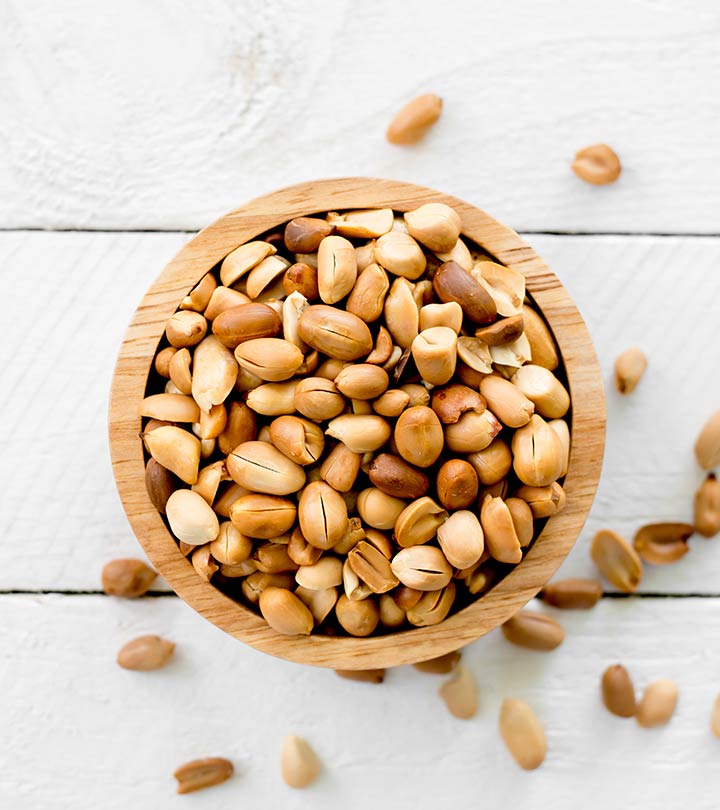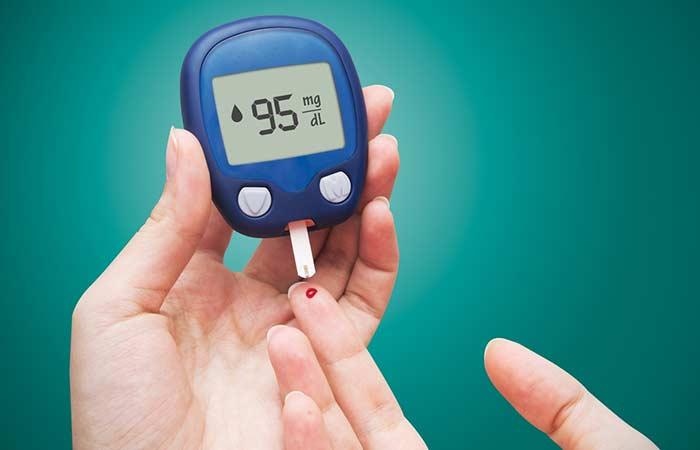Impressive Peanut Benefits To Make You Fall In Love With Them!
 PEANUT
PEANUTLet us break it to you – peanuts are not nuts. They are legumes. They are popular all around the world for their delicious taste.
In the US, they are almost always consumed roasted or salted and even as the all-popular peanut butter.
Peanuts are not just mouth-watering delicacies – there is more to them. Their powerful constituents promote heart health and aid diabetes treatment. These legumes offer more benefits for your health than you could ever imagine.
How Are Peanuts Good For You?
Peanuts are scientifically called Arachis hypogea. They are also known as groundnuts, goobers, and earth nuts. They have their origins in South America.
There are four major types of peanuts. These include Runner, Virginia, Spanish, and Valencia.
Peanuts contain essential functional nutrients like fibers, proteins, antioxidants, polyphenols, and vitamins and minerals. They also contain all the 20 amino acids, the most abundant of them being arginine (1). These compounds can prevent disease and promote longevity.
The arginine in peanuts is known to stimulate the immune system. Peanuts also contain resveratrol, a bioflavonoid known to cut the risk of stroke (1).
Peanuts display protective effects against cardiovascular disease, diabetes, cancer, and other diseases (1).
To sum it up – peanuts are nutritional powerhouses. What this variety of nutrients achieves is something beyond incredible.
What Are The Health Benefits Of Peanuts?
Peanuts are chock-full of important nutrients, antioxidants, and fatty acids. These promote heart health by regulating cholesterol levels and aid diabetes treatment as well. The antioxidants in peanuts also help cut down cancer risk.


1. Peanuts Promote Heart Health
A team of researchers found that in over 200,000 people across the globe, those who regularly ate peanuts were far less likely to die of heart disease (2).
Peanuts (and other nuts, in general) can lower the bad cholesterol (LDL) levels (3). Bad cholesterol leads to plaque development on the blood vessels, and peanuts can prevent this.
Peanuts also reduce the inflammation that may cause heart disease (3).
The resveratrol in peanuts also helps combat heart disease. Peanuts seem to have similar cardioprotective effects as other nuts (4).
Regular peanut intake also lowers triglycerides, further promoting heart health (5). This effect can be attributed to their content of monounsaturated fatty acids, folate, and magnesium.
In another study, peanuts had increased the levels of good cholesterol (6).
2. Can Lower Blood Sugar Levels
Shutterstock
Peanuts have a GI score of 14. On a 100-point scale, while the GI of peanuts is 14, the GL (glycemic load, which tells what a particular food will do to your sugar levels) is just 1.
This means adding peanuts or peanut butter to a meal doesn’t spike blood sugar levels. Including them along with a meal high in GL (like a bagel or a glass of juice) may stabilize the blood sugar levels. The American Diabetes Association names peanuts as diabetes superfoods (1).
The fiber in peanuts also helps lower blood sugar levels. They also contain magnesium and other healthy oils that don’t largely affect your blood glucose levels.
Consuming peanuts or peanut butter right in the morning may control your blood sugar levels throughout the day (7). A higher intake of peanuts and peanut butter can reduce the risk of type 2 diabetes in women (8).
Daily intake of a diet enriched with peanuts over 24 weeks could improve health parameters in patients with type 2 diabetes (9). The rich nutritional profile of peanuts is responsible for this – which includes monounsaturated fat, fiber, arginine, niacin, folate, and vitamin E.
3. May Aid Weight Loss
Peanuts are energy-dense foods. Including them as a snack may make you consume fewer calories later in the day (10).
Compared to eating them with a meal, peanuts elicited stronger feelings of fullness when consumed as a snack. This may eventually help with weight loss.
Including peanuts (along with other nuts) in one’s diet is one way to enhance palatability and nutrient intake without causing weight gain (11).
Research also shows that consumption of peanuts and peanut butter can increase the feelings of fullness. These could satisfy customers better than carbohydrate snacks in equal quantities (1).
4. May Prevent Cancer
High intake of peanuts (including other nuts) has been associated with a reduced risk of colorectal cancer (12). The isoflavones, resveratrol, and phenolic acid in peanuts can cut cancer risk.
Peanut intake is also associated with a reduced risk of postmenopausal breast cancer (13).
Among older American adults, peanuts were also found to prevent gastric and esophageal cancers. When comparisons were made, individuals who did not consume any nuts had the highest risk of contracting these cancers (14).
However, there is a concern with respect to peanuts and cancer. Peanuts might be contaminated with aflatoxins, a family of toxins produced by certain fungi. These toxins may cause cancer (15).
You can reduce this risk by buying peanuts only from major commercial brands. Discard nuts that look discolored, shriveled, or moldy as these are highly likely to be contaminated. Consuming peanuts from a reliable organic brand also reduces the risk of contamination.
5. Prevents Gallstones
Consumption of peanuts is linked to a lowered risk of gallstones (16). Men consuming 5 or more units of nuts (including peanuts) a week had a lower risk of gallstone disease.
Women consuming 5 or more units of nuts a week had a reduced risk of cholecystectomy (removal of the gallbladder) (17).
6. May Treat Erectile Dysfunction
Peanuts are rich in arginine, an essential amino acid (18). Arginine has been studied extensively as a possible treatment for erectile dysfunction.
Whether L-arginine may alone treat erectile dysfunction is still being researched upon. But studies confirm that when this amino acid is taken along with a herbal supplement (called pycnogenol), treatment for erectile dysfunction is possible (19).
7. May Relieve Symptoms Of Polycystic Ovarian Syndrome
There is very little research on this, but some sources suggest that peanut intake could be an effective method of treating PCOS. The reason could be the abundance of monounsaturated fats in peanuts (20).
8. May Boost Hair Growth
There is very less research here as well. Since peanuts contain all the amino acids and protein, they might be a good supplementation to a diet for hair growth (21).
If you are looking at specific treatments for hair fall, it is better you consult your doctor.
Peanuts are replete with nutrients. They are among the most nutritionally dense foods on the planet. We saw a few of those nutrients already. But there are more.
What Is The Nutrition Profile Of Peanuts?
This brings us to one big question – raw or boiled? Which type of peanuts is better?
Well, both are equally nutritionally rich. Raw peanuts might carry a risk of aflatoxin. But if you are going for the branded variety, you don’t have to worry about it.
Some research shows that boiling peanuts enhances their antioxidant content (1). Boiled peanuts have a two to four-fold increase in their isoflavone antioxidant content. This way, boiled peanuts could be a better choice – if you have the time and patience.
The simplest way to eat peanuts is to just pop them into your mouth. If you find that a tad bit boring, we have other interesting ways.
How Else To Eat Peanuts?
You can eat raw or boiled peanuts in your evening salad. Top your breakfast cereal with peanuts. You can also add peanuts to frozen yogurt.
Apart from this, you can also try out this popular peanut recipe.
Honey Roasted Peanuts
What You Need
Directions
Honey roasted peanuts would be a wonderful addition to your diet. But hold on – there are some concerns with peanuts that you must be aware of.
What Are The Side Effects Of Peanuts?
As discussed, the possible aflatoxin contamination is a cause for concern. Serious aflatoxin poisoning can cause liver cancer and liver failure (22). They occur in food products when they are stored in conditions that promote fungal growth (23). You can prevent their growth by keeping the humidity and temperature low while storing peanuts.
Peanuts may cause allergies in some individuals. These allergies can be potentially life-threatening (24). If you develop an allergic response, please visit your doctor immediately.
Peanuts contain phytates, compounds known to inhibit iron absorption (25). Consuming peanuts with ascorbic acid (vitamin C) can help overcome this.
Conclusion
Peanuts are some of the nutritionally richest foods available in the market. A handful (about 12 nuts) of them a day can amp up your health. They are easy to add to your diet – and they make any dish oh-so-delicious.
Do you eat peanuts every day? How do you include them in your diet? Let us know by leaving a comment in the box below.


Comments
Post a Comment